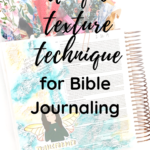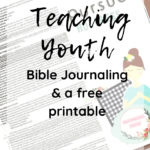Hi Friends! How are you all? It’s been a little while since I’ve written a blog instead of done a video. But today I’ve got something I’m really excited to share with you: a Bible study cheat sheet! We all know it’s important to study the Bible, but sometimes we can get in ruts or struggle to know exactly how to do that. Today I want to give you a bit of encouragement for studying your bible on your own.

I should probably preface this blog with and acknowledgement that I love devotionals, sermons and other bible study aids. I’ve even written a few myself that are available in our Freebies Library and Shop. However, today I want to make a point to discuss the value and importance of studying the Bible on your own; without other people spelling it out, or telling you what it means.
I know, this idea can be really intimidating. The Bible is a complex book with various writing styles, authored over several centuries. Some parts come across more straightforward than others, and even the straightforward parts can be confusing. But I believe that all Christians are able to read and understand God’s Word and I believe it’s a good spiritual discipline to practice.
Like I said, I’ve got nothing against devotionals or other forms of learning about scripture from teachers. I think they can be really helpful and informative tools. But if all we ever do is read scripture through the lense of another, we’re missing out!
God has something to say to you through His Word and He doesn’t need someone else to explain it to you. He gave you the Holy Spirit to help you discern His Will and to understand things beyond understanding. It may not come easy, or always make sense, but I do believe it’s worth it.
The practice of reading scripture and interpreting it is not one that is just for pastors and theologians. All believers are capable of reading and interpreting God’s word. I would even say that it benefits the whole body of believers to have us all regularly practice this. What you don’t see another might and vice versa. As we interpret scripture together, we learn more of God’s heart and gain a better understanding of God’s word.
In a day when we have access to any number of theologically sound teachings on scripture and double the amount of unsound teaching, too often we neglect actually studying it for ourselves. Don’t mistake reading a theological book or devotional or listening to a sermon, with actually studying scripture. To study something you have to immerse yourself in the thing. You have to look at it, observe it for yourself. You have to make your own observations and notes.
As I said, this idea can be intimidating. At times our insecurities will tells us we can’t understand or to just stick to the easy books. Our laziness will tell us it’s easier to just see what someone “smarter” than us has to say. But God says He’s given us the Holy Spirit to teach and guide us. We can tap into that!

So to encourage and challenge you to make personal Bible study a priority, I’ve created three Bible Study Guides that are available in our Freebies Library. These guides are different from a devotional or sermon in that they don’t do any interpreting for you. They simply guide you to scriptures to read and questions to ask/answer as you go.
The first is a list of Scriptures to read when you aren’t sure what to read (p.s. – another great option is to just start at the beginning and read all the way through at your own pace). The second two guides are questions to ask and answer as you read and do your own study )one for contextual application and one for personal application).
Before you start, here are a few tips to use along with the guides:
- Read the passage in multiple translations – different wording can make a complex idea more understandable or can speak to you in a different way.
- Avoid reading only one or even just a few verses at a time. Read a whole chapter or few chapters to get the whole context of the words, then zone in on the smaller parts that stood out to you after.
- Make use of Bible footnotes, chapter prefaces, or Google when it comes to some of those context questions. The fact that Paul wrote the book of Romans to the Christians in Rome isn’t an interpretation issue, it’s just a fact that you might not know unless you did a little research. The answers to those context questions can help us in our own interpretations though.
- AFTER you’ve conducted your own study, read other’s interpretations and thoughts on the passage. See what others caught that you didn’t and what you caught that no one else seems to have noticed. Have conversations with friends and mentors and discuss what you both learned.

Well there you have it! Be sure to get your Bible Reading Cheat Sheets in our freebies library and give them a try. Let us know how they work for you and if you have any other Bible study tips in the comments below.







